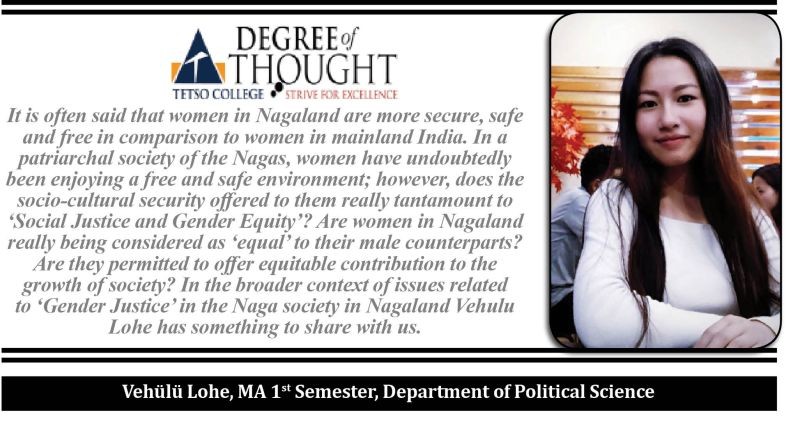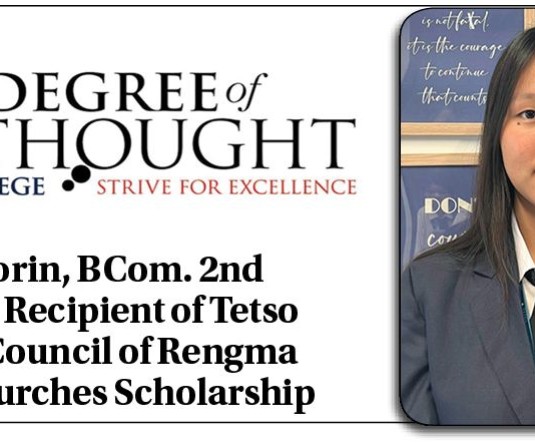
Around the world, tradition often opposes equality. But when it comes to the question of gender equality, such situations can become volatile. Our Nagaland is no different. Nagaland is the only state in India where there has been a sustained opposition to the 33 percent reservation for women’s participation in public office. Nagaland, in Northeast India, with a population of 1.9 million, has managed its own civil and legal affairs since its inception as a federal unit within the Republic of India in 1963. Customary courts and traditional tribal organizations have functioned as the administrative and moral authorities in the state. Although there is a Legislative Assembly where members are elected through the Indian electoral system every five years, the traditional courts and organizations enjoy a degree of influence which is unprecedented and except a few other states of Northeast India, it cannot be found in other parts of the country. A provision within the Constitution of India, known as Article 371(A) guarantees protection of Naga culture and customs, land ownership, including preservation of local, social and religious practices.
Perhaps the gendered political distinctions that emerged over the decade were so deep that even movements that fought for freedom and independence deviated from a collective understanding of history. This was present in Naga national history. Only Naga males became martyrs. Women were always victims. How can we talk about equality as a foundational pillar when justice, equality and freedom in Naga society have remained the prerogative of the few? Can a society be called democratic when a minority has defined such a heroic and masculine militarized past? Today the Naga poor, which includes orphans, widows, the unemployed youth, old people, and a large section of the disenfranchised public, cannot take part in this debate. These are inherent contradictions. These are flaws that cannot be integrated into the vision of a just Naga society by simply including women who have been excluded.
Naga society is deeply patriarchal, and it is believed that women must be respected and their security cannot be compromised –especially by men. But the traditional law of the Naga society clearly distinguishes gender roles and gendered responsibilities. For instance, women are in charge of domestic issues, such as family and its related issues, while men deal with society, including village administration and councils. Women have therefore been excluded from the political realm. They are not allowed in the traditional village councils that oversee village management, and from “village development boards”, smaller local institutions that regulate economic projects.
Local consciousness of a distinct social identity emerged as part of a patriarchal discourse after the ‘Naga Club’ was formed in 1918. Young boys from different Naga tribes met in different educational institutions and hostels, and they together constructed a common “Naga'' identity. Already, under pressure from local groups, several Naga women groups have severed ties with their lead women’s organisation pushing for the 33% quota, the Naga Mothers Association. Naga women may now find themselves in a lose-lose situation. The political violence erupted prior to municipal elections, when women’s organisations, under the leadership of the Naga Mother’s Association (NMA), demanded the application of Indian law 243(T) of Indian Constitution which states that 33% of seats should be reserved for women within local political bodies. Their demand was vehemently rejected, and male politicians invoked “tribal traditions'' as their main argument. The conflict sparked deadly street protests in which mobs attacked offices, and shops were destroyed in the main cities.
“The impression about women being empowered, particularly in Naga society, is largely a myth. Though much progress has been made in the field of education and employment, especially in the urban areas, yet ’empowerment ‘ in the real sense is debatable because women do not have real decision-making powers within their home, community, over the landed resources, over marriage, over reproductive health and so on,” says Monisha Behal, NEN (North East Network) chairperson and well-known women rights activist. Being a patriarchal society, customary laws in the Naga society have always been interpreted from a patriarchal mindset. “And this is why we notice the loops or biases largely in laws related to women,” she added. For instance, the study highlights that “on consideration of a woman’s physical weakness, an Ao Naga woman suffers from disqualification in the following ways:
She can’t become a member of Putu Menden (traditional village/clan/tribal council which is the highest decision making body in Ao society) She can’t become the patir/putie (village councilor) though she may be the oldest person in the village. She is debarred from performing religious rites and sacrifices. She can’t participate in debates of public interest. She is not entitled to get honour, title and fame.” An Ao woman also can’t inherit landed property. After the father dies, even the mother has to seek the son’s permission to cut firewood from his land.
“The customary laws of Chakhesang Nagas state that when a married woman is caught for adultery, she is forced to leave her husband’s house with only the clothes she is wearing, with a fine imposed on her depending on the gravity of the situation. But if a married man brings his lover home and creates disharmony in the family, he doesn’t need to leave, but will have to give his wife half the property acquired during his married life,” Behal says, giving another example of gender biases in such laws. The NEN study also highlights violence against women in the domestic space in rural Nagaland. There is no recourse for them in the customary laws. “If a man gets intoxicated and beats up his wife, alcohol is considered to be the enemy, not the man’s behavior. Also, there is a misconception among men that verbal violence on women is fine, unless it amounts to physical violence,” says Behal quoting the study data.
Referring to occurrences of sexual abuse on women, like rape, a male village head in Phek district told the researchers, “On one hand, the blame can be on the man but on the other hand, may be even the woman is wrong. The last rape case in a nearby town happened in a forest. If the woman had not followed him or did not stay in contact with him, then rape will not randomly happen in the open or public space. So if the woman had not followed that man to the forest, there was no chance of the rape happening.”
Some women that NEN spoke to in the Phek district said, “Suppose the woman likes the perpetrator and then a rape occurs, then there is minimal right for the woman to complain. But if the woman is stranger to him, we will file a case against the man.” In such cases, the only women’s agencies for redress are the larger tribal women’s organisations, such as the Naga Mothers’ Association and Naga Womens’ Union.
This is the bitter ground reality of Nagaland. Gender equality cannot be measured in terms of the scale of so-called ‘SECURITY’ that is claimed to have been given to women by male folks. The notion that women are not able to protect themselves, they are weak sex and therefore they need men to protect them is a result of male chauvinistic perspective which modern women TOTALLY deny and condemn wholeheartedly. A modern Naga woman has taken a stride forward to claim what is hers- THE DIGNITY AND FREEDOM!
Degree of Thought is a weekly community column initiated by Tetso College in partnership with The Morung Express. Degree of Thought will delve into the social, cultural, political and educational issues around us. The views expressed here do not reflect the opinion of the institution. Tetso College is a NAAC Accredited UGC recognised Commerce and Arts College. The editors are Dr Hewasa Lorin, Dr Aniruddha Babar, Nisha Dahiya and Meren. For feedback or comments please email: dot@tetsocollege.org






